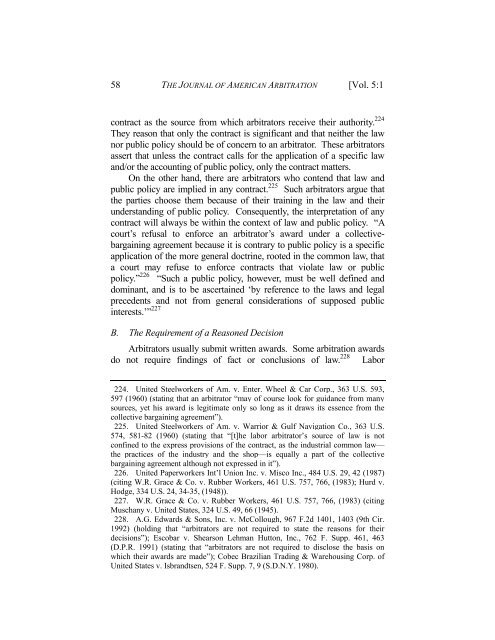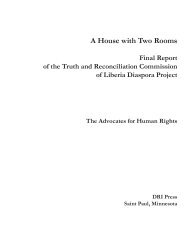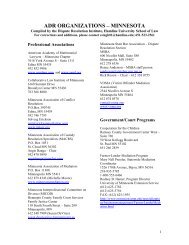2006/Vol. 5 No.1 - Hamline Law - Hamline University
2006/Vol. 5 No.1 - Hamline Law - Hamline University
2006/Vol. 5 No.1 - Hamline Law - Hamline University
You also want an ePaper? Increase the reach of your titles
YUMPU automatically turns print PDFs into web optimized ePapers that Google loves.
58 THE JOURNAL OF AMERICAN ARBITRATION [<strong>Vol</strong>. 5:1<br />
contract as the source from which arbitrators receive their authority. 224<br />
They reason that only the contract is significant and that neither the law<br />
nor public policy should be of concern to an arbitrator. These arbitrators<br />
assert that unless the contract calls for the application of a specific law<br />
and/or the accounting of public policy, only the contract matters.<br />
On the other hand, there are arbitrators who contend that law and<br />
public policy are implied in any contract. 225 Such arbitrators argue that<br />
the parties choose them because of their training in the law and their<br />
understanding of public policy. Consequently, the interpretation of any<br />
contract will always be within the context of law and public policy. “A<br />
court’s refusal to enforce an arbitrator’s award under a collectivebargaining<br />
agreement because it is contrary to public policy is a specific<br />
application of the more general doctrine, rooted in the common law, that<br />
a court may refuse to enforce contracts that violate law or public<br />
policy.” 226 “Such a public policy, however, must be well defined and<br />
dominant, and is to be ascertained ‘by reference to the laws and legal<br />
precedents and not from general considerations of supposed public<br />
interests.’” 227<br />
B. The Requirement of a Reasoned Decision<br />
Arbitrators usually submit written awards. Some arbitration awards<br />
do not require findings of fact or conclusions of law. 228 Labor<br />
224. United Steelworkers of Am. v. Enter. Wheel & Car Corp., 363 U.S. 593,<br />
597 (1960) (stating that an arbitrator “may of course look for guidance from many<br />
sources, yet his award is legitimate only so long as it draws its essence from the<br />
collective bargaining agreement”).<br />
225. United Steelworkers of Am. v. Warrior & Gulf Navigation Co., 363 U.S.<br />
574, 581-82 (1960) (stating that “[t]he labor arbitrator’s source of law is not<br />
confined to the express provisions of the contract, as the industrial common law—<br />
the practices of the industry and the shop—is equally a part of the collective<br />
bargaining agreement although not expressed in it”).<br />
226. United Paperworkers Int’l Union Inc. v. Misco Inc., 484 U.S. 29, 42 (1987)<br />
(citing W.R. Grace & Co. v. Rubber Workers, 461 U.S. 757, 766, (1983); Hurd v.<br />
Hodge, 334 U.S. 24, 34-35, (1948)).<br />
227. W.R. Grace & Co. v. Rubber Workers, 461 U.S. 757, 766, (1983) (citing<br />
Muschany v. United States, 324 U.S. 49, 66 (1945).<br />
228. A.G. Edwards & Sons, Inc. v. McCollough, 967 F.2d 1401, 1403 (9th Cir.<br />
1992) (holding that “arbitrators are not required to state the reasons for their<br />
decisions”); Escobar v. Shearson Lehman Hutton, Inc., 762 F. Supp. 461, 463<br />
(D.P.R. 1991) (stating that “arbitrators are not required to disclose the basis on<br />
which their awards are made”); Cobec Brazilian Trading & Warehousing Corp. of<br />
United States v. Isbrandtsen, 524 F. Supp. 7, 9 (S.D.N.Y. 1980).
















